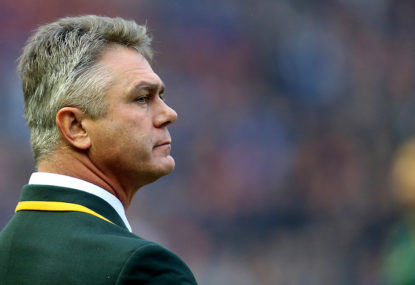Heyneke Meyer has for too long ignored the elephant in the room. It’s about the way the Springboks play.
It’s an obvious truth the Springbok coach ignores and has failed to address. It’s a problem or risk he doesn’t want to discuss.
He did finally take a ride on the elephant in the last 11 minutes of the game and the decision saw the Springboks run through the tiring Wallaby defence.
At that stage the Australians led the game 10-8 after a mediocre South African safety-first performance. It had fans sitting with their hearts in hands. Meyer’s fingernails must have been chewed to the bone.
But then came the change in game plan. The same-old structured tactics were discarded and the Springboks ran in three tries at the death. The match was in the balance before Bismarck du Plessis, Schalk Burger and Patrick Lambie joined the battle at Newlands.
It is an over simplification to hand the credit to a rampant Schalk Burger or to two-try captain Jean de Villiers, who was on hand to dot the ball down.
We owe the victory to the fact we opted for a more expansive game plan. In this, Lambie, brought on at flyhalf after an unimpressive display by Handre Pollard, played a vital part. Twenty-year-old Pollard, with only a handful of Test caps, missed touch with penalty kicks, had some of his relieving efforts charged down and once nervously passed the ball into touch.
Lambie, a 24-year-old, with more than 30 Test caps, previously given so little game time and ignored, much like the elephant, provided a vital spark. He did miss an easy penalty, but a drop-goal and a try from a man with a rugby brain should see him start against the All Blacks at Ellis Park.
As World Cup-winning Springbok coach Jake White says, Lambie is a natural flyhalf, not a fullback, as Meyer has often played him as a second-string to Willie le Roux.
After the game Wallaby captain Michael Hooper praised the performances of Burger and Lambie and said their inclusion made a huge difference.
In the end, the change in attack, the width we got from the introduction of a marauding Burger, Lambie and an electric Cobus Reinach, at the base of the scrum, opened the floodgates. Suddenly, le Roux had more space to move in and Jan Serfontein and Cornal Hendricks could cut through the Wallaby defence.
Meyer does like some elephants. Big is better is his view. We are blessed with any amount of them among the forwards. However, in this match, the Wallabies matched us up front and gave us problems at the breakdown.
The 28-10 scoreline flattered the Boks. It was a match we could have lost had the Australians not run out of steam. The move to bring on experienced players from the bench, however, proved decisive.
But for most of the game, the Springboks were plagued by handling errors. Players at times were isolated and the big, but less mobile forwards, including the ageing 37-year-old warhorse Victor Matfield, were too slow to the breakdown. The Australians often counter-rucked and got turnover ball.
After the game, de Villiers announced that the substitutions had always been the plan.
“We always said that if we stick to our structures in the first 60 to 70 minutes, we believe we can break them down in the last 10 [minutes],” de Villiers said.
Is that the way to play? Bank on winning the game with a late charge? Why not play 80 minutes that way? Before that late surge, we were down 10-8. The late charge paid off, but that is hardly an intelligent game plan.
In an interview before the match, former Springbok coach Pieter de Villiers, who can boast victories over the All Blacks, had this to say.
“We’ve been brought up in this country not to think rugby but just to play to structures,” he said.
“Any team that is structure-driven has a complex because they believe that the scoreboard will define them.
“Slowly and subtly we changed beliefs and the players realised there was another way of doing things. You earn the right to run the ball, and earn the right to kick.
“If, for example, you go on to the field and say that you’re going to kick or run, then you are not playing the situation in front of you.”
In my view, if we hope to be the world’s best team, we have to play a more intelligent and attacking game for 80 minutes, not just 11.
If Meyer blindly sticks to his big-is-better philosophy and opts for safety-first, structured tactics, we don’t look likely to get our hands on the Webb Ellis Cup next year.
All teams have a game plan. The difference is that the All Blacks have several options up their sleeves and use them during a game. We appear to stick around, hoping to pull off a win near the end of a game.
All credit to the Springboks, who showed great character. But my kudos go to the players, not the coach.
Meyer should yank his head out of the sand and take a good look at the elephant in the room. He needs to embrace, not ignore it.





























































































